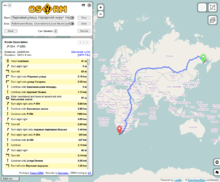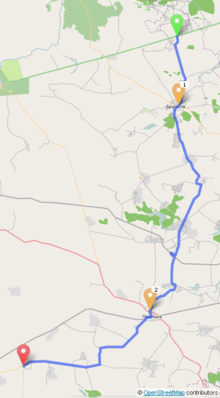Open Source Routing Machine
The Open Source Routing Machine or OSRM is a C++ implementation of a high-performance routing engine for shortest paths in road networks. Licensed under the permissive 2-clause BSD license, OSRM is a free network service. OSRM supports Linux, FreeBSD, Windows, and Mac OS X platform.
 | |
 | |
| Original author(s) | Dennis Luxen, Christian Vetter |
|---|---|
| Repository | |
| Written in | C++ |
| Operating system | Linux, FreeBSD, OS X, Windows |
| Type | Route planning software |
| License | Simplified BSD License[1] |
| Website | project-osrm |
Overview
It combines sophisticated routing algorithms with the open and free road network data of the OpenStreetMap (OSM) project. Shortest path computation on a continental sized network can take up to several seconds if it is done without a so-called speedup-technique. OSRM uses an implementation of contraction hierarchies and is able to compute and output a shortest path between any origin and destination within a few milliseconds, whereby the pure route computation takes much less time. Most effort is spent in annotating the route and transmitting the geometry over the network.
Since it is designed with OpenStreetMap compatibility in mind, OSM data files can be easily imported. A demo installation is sponsored by Karlsruhe Institute of Technology and previously by Geofabrik. The screen shot image shown is since September 2015 out of date with loss of attendant routing service features.
Features

- 'Click-to-drag' dynamic routing, in the manner of Google Maps
- Alternative routes
- Free-to-use API
- Free and open-source under the simplified two-clause BSD license
See also
References
- "osrm-backend/LICENSE.TXT at master · Project-OSRM/osrm-backend · GitHub". 26 April 2020.
- "Improvements to the Open Source Routing Machine (OSRM)". Archived from the original on 2013-12-19.
Further reading
- Vetter, Christian; Luxen, Dennis (2011). "MoNav & OSRM: 1 Jahr später" (PDF). Legato.net (in German). pp. 42–43. Archived from the original (PDF) on October 5, 2014. Retrieved May 16, 2012.
- Hubel, Andreas (November 15, 2011). "Webbrowserbasierte Indoor-Navigation für mobile Endgeräte auf Basis der OpenStreetMap" (PDF). Andreas-hubel.de (in German). pp. 7–8. Archived from the original (PDF) on December 22, 2015. Retrieved May 16, 2012.
- Vetter, Christian; Luxen, Dennis (November 6, 2011). "Real-time routing with OpenStreetMap data". Association for Computing Machinery. pp. 513–516. Retrieved February 5, 2013.
External links
- As of 18 May 2012, this article is derived in whole or in part from Open Source Routing Machine. The copyright holder has licensed the content in a manner that permits reuse under CC BY-SA 3.0 and GFDL. All relevant terms must be followed.